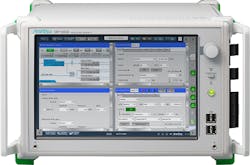PCI Express 5.0 Test System Ensures System Compliance
The growing complexity of the Cloud and IoT demand proper deployments with qualified and compliant solutions. Anritsu and Tektronix will provide an automated PCI Express 5.0 (PCIe Gen5) test solution that combines Anritsu’s Signal Quality Analyzer-R MP1900A BERT series and Tektronix’s DPO70000SX series 70 GHz real-time oscilloscope and automation software. This will facilitate development of high-speed devices and networks for advanced communication environments, including 5G.
The solution can be configured to support required PCIe 5.0 specifications, addressing automated transmitter test, receiver jitter tolerance test, and Tx/Rx LEQ compliance test. Waveform-calibration automation software and an analysis function with an event trigger, and high-speed calibration between the MP1900A BERT and DPO70000SX oscilloscope reduce test times. The solution supports PCIe 1.0-5.0 without a hardware upgrade, and can be upgraded to PCIe 6.0 test capability with additional hardware.
A multi-channel BERT for designing and testing, the Signal Quality Analyzer-R MP1900A series offers network interfaces such as 200G/400G/800G Ethernet, as well as high-speed bus interfaces like PCI Express 4.0/5.0, USB3.2, USB4, and Thunderbolt. A built-in pulse pattern generator produces high-quality waveforms (115 fs low intrinsic jitter), as well as a high-sensitivity (15 mV) error detector (ED). Additional features include a jitter (SJ, RJ, SSC, BUJ) generation source and CM-I/DM-I/white-noise generation source. Able to evaluate PAM4 of optical modules, SERDES, and other technologies in data-center 200G/400G/800G Ethernet systems, the MP1900A BERT also evaluates PCIe 6.0 (PAM4 32 Gbaud) devices to ensure compliance with the latest PCI-SIG standard.
An automated PCIe Gen5 (32 GT/s) Base & CEM transceiver solution, the Tektronix DPO70000SX series 70 GHz Real-time Oscilloscope and Anritsu Signal Quality Analyzer-R MP1900A BERT use an optimization algorithm to correct 32 GT/s and 16 GT/s stressed-eye waveforms using the leading SigTest Phoenix test tool and fast parallel processing. There is also support for M.2 and U.2 form factors and clocking architectures (CC, SRNS, SRIS), as well as A/D range optimization and low-noise PCIe Gen5 Base specification 32 GT/s uncorrelated jitter and pulse-width jitter measurements.
About the Author
Alix Paultre
Editor-at-Large, Electronic Design
An Army veteran, Alix Paultre was a signals intelligence soldier on the East/West German border in the early ‘80s, and eventually wound up helping launch and run a publication on consumer electronics for the US military stationed in Europe. Alix first began in this industry in 1998 at Electronic Products magazine, and since then has worked for a variety of publications in the embedded electronic engineering space. Alix currently lives in Wiesbaden, Germany.
Also check out his YouTube watch-collecting channel, Talking Timepieces.

